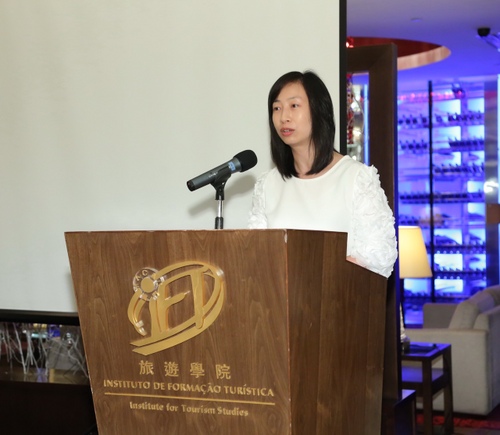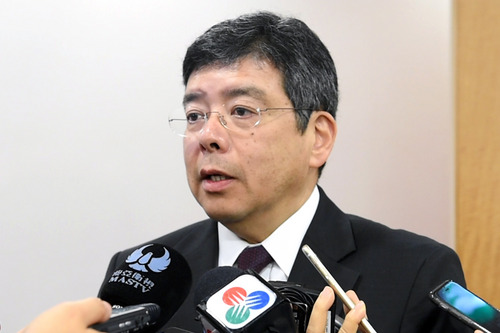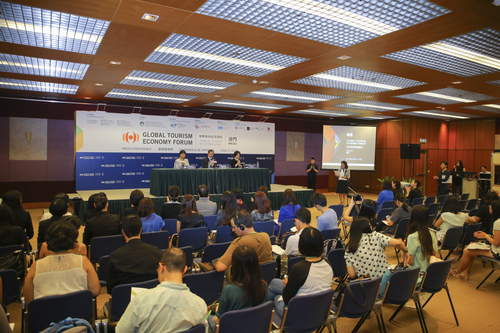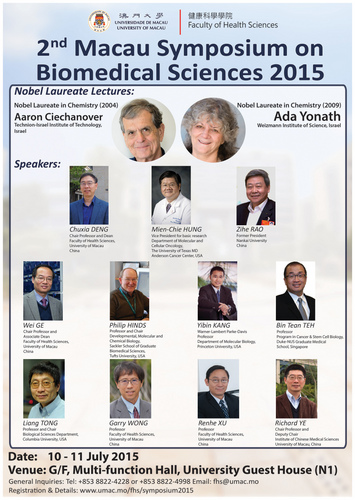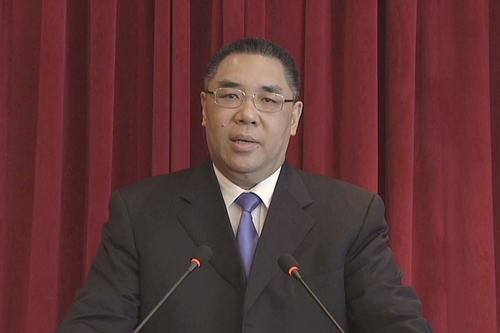Macao SAR Government Portal
News
Extension of withdrawal period of the MOP10 notes issued in 1991 & 1995
In accordance with the stipulation of the Despacho do Chefe do Executivo No.117/2015, the withdrawal period for the MOP10.00 banknotes issued by Banco Nacional Ultramarino, S.A.(Authorized by Decreto Lei No. 40/91/M on 8th July) and by Bank of China (Macao Branch) (Authorized by Decreto Lei No.8/95/M on 30th Jan) has been extended to 26th May 2018. The Monetary Authority of Macao would like to remind citizens with the aforementioned banknotes in their possession to have their notes exchanged at Issuing Banks within the stated period.
…
Airport conducts exercise on unlawful seizure of aircraft to test the capacity of personnel involved in the emergency
The annual security exercise with “unlawful seizure of aircraft” for this year’s theme was conducted in Macau International Airport in today’s early morning (18 June 2015). The exercise simulated the scenario that a foreign political organization that has activated several terrorist attacks in their own country has unlawfully seized an aircraft and requested to land in Macau International Airport. The airport immediately activated the emergency plan to handle the incident and rescued the passengers and the crew members eventually. The exercise was deemed to have reached its goal. Public Security Police Force was the coordinator of the exercise which took place from 00:00 to 05:30. About 250 people participated in it. The exercise aimed at testing and assessing the efficiency of the airport emergency plan and the action plans of the various participating entities. An aircraft was simulated to be unlawfully seized by 4 members of a foreign terrorist organization that requested to land the aircraft in Macau International Airport. The hijackers were armed with weapons; the passengers and the crew members on board were held captive. When the captain of the aircraft notified the airport control tower of the incident, the control tower immediately communicated the incident with the relevant entities in accordance with the airport emergency plan. The Airport Emergency Operations Centre was activated and representatives from all relevant entities arrived at the centre to handle the incident. The authorities eventually arrested the hijackers and rescued all the passengers and the crew members. Apart from Public Security Police Force, the other participating entities were Unitary Police Force, Macao Customs Services, Security Coordination Office, Judiciary Police, Fire Services Bureau, Health Bureau, Marine and Water Bureau, Civil Aviation Authority, CAM-Macau International Airport Company Ltd, Administration of Airports, Ltd., Air Macau Company Ltd., Macau Security Company Ltd. (airport security) and Menzies Macau Airport Services Ltd. To enhance the capacity of the entities and the personnel involving in airport security to handle incidents of unlawful interference, the International Civil Aviation Organization requests all countries or administrations to carry out a security exercise once every two years. Although Macao is considered a low risk place in terms of terrorism, the need to guarantee the safety of passengers and their properties is always kept as the priority work by the Facilitation and Security Committee. The Committee adopts a higher standard than the international one by incorporating, on an annual basis, a security exercise as part of the training activities in the yearly schedule of events.
…
IFT organises 20th anniversary media dinner
The Institute for Tourism Studies (IFT) hosted the 20th anniversary media dinner at IFT’s Educational Restaurant on 17 June. The attending media from local newspapers, magazines and television outlets were warmly welcomed by Dr. Fanny Vong, President of IFT, Mrs. Diamantina Coimbra, Director of Tourism and Hotel School, Mr. Oscar Ho, Regent of Internship Programme and Ms. Tannia O, Functional Head of International Affairs. President Vong expressed her gratitude to the continuous support from the Macao SAR Government, industries, community and media over the years. With the support, IFT has developed itself locally and internationally along with Macao’s tourism development. She also mentioned that as the only higher education institution in Macao specialised in tourism and hospitality, through the past two decades of development, IFT has made significant progress in various areas, with increasing student intake, quality and variety of programmes and courses, as well as teaching and research strength. The Institute is not simply the first educational institution being recognised with the “UNWTO.TedQual Certification” by the United Nations World Tourism Organization(UNWTO). Besides, 3 more degree programmes were recognised by them this year. In total, 7 out of 8 degree programmes have been recognised by the Certification, leading IFT to become the higher education institution with the most bachelor degree programmes being recognised by the UNWTOin the world. In 2014, IFT was also honoured “Best Educational Organizational Brand and Service” in the “3rd Macao Elite Service Award” as voted and supported by the public. In 2013, the Institute became the first higher education institution in Macao and Hong Kong to gain the ISO 20000 accreditation. The number of four-year undergraduate students has increased by more than 13 times, from a hundred in the beginning to currently over 1,500 students while an average of 20,000 people participated in professional training courses every year. At present, IFT offers 6 daytime degree programmes and 2 evening degree programmes in culinary management, hotel management, heritage management, tourism business, events, retail & marketing. The Institute keeps introducing new professional training courses, with hundreds of fundamental, advanced and higher level courses offered every year, some of which are international qualification courses co-organised with up to 19 international certified organisations around the world. Furthermore, it co-organises executive development programmes together with world-renowned Cornell University School of Hotel Administration, the United States and Ecole Hoteliere de Lausanne, Switzerland every year, enabling the local hotel industry executives and professionals to keep abreast of the latest development and trends of hotel management. IFT aims at developing into an international leading institution. Its excellent education quality attracts international students and exchange students from 16 counties and regions to the Institute to study. It adheres to invite scholars and industry elites through global recruitment to join the teaching crew, in order to form a strong team with considerable academic attainments and practical experiences. In recent years, the number of researches published by the academic members has increased substantially, and the faculty members are often invited to other institutions for talks and exchanges, and also appointed by Macao SAR Government to conduct research projects and provide professional advices. IFT maintains close connection with the local as well as global leading organisations in the tourism industry. More than 500 companies and organisations have provided internship opportunities for students, and over 85 institutions and tourism organisations from 27 countries and regions have maintained partnership and cooperation with IFT. IFT is the only institution in Macao that adds practicum courses and half-year internship programme to all undergraduate students, enabling them to establish ties with the industry and gain work experience while they are still at school, bringing them in line with the real work environment more quickly. Last year, the Institute conducted a large-scale survey on the employment situation of alumni. Around 70% of the alumni being interviewed joined the tourism and service industry and a considerable percentage of whom had been promoted to senior executives or mid-senior level positions. With professional knowledge and skills, they are favoured by the industry. A substantial number of alumni chose to pursue master’s degree and even doctoral degree after graduation, and some of them were admitted to renowned universities at home and abroad. The year of 2015 is a milestone for the Institute. With the receiving of the East Asia Hall at the former University of Macau campus and the amendments of Higher Education Law, the Institute will face exciting opportunities for more new development. Looking to the future, the Institute hope to further enhance the hardware facilities, expand the faculty scale, optimise teaching and learning environment, provide quality professional training, undergraduate and master’s degree programmes, and continue to make contributions to the higher education of Macao.
…
Secretary for Social Affairs and Culture conducted a work meeting with MGTO officials and market representatives today
Secretary for Social Affairs and Culture Alexis, Tam Chon Weng conducted a work meeting with Macau Government Tourist Office (MGTO) officials and market representatives this morning (17 June). In the meeting, MGTO market representatives reported their achievements at work and discussed future marketing plans. In the meeting, Secretary Tam recognized the efforts by market representatives in promoting Macau tourism and encouraged them to stress on the unique tourism resources and diversified tourism-related elements, especially the integration of tourism, culture, sports and other elements in order to further diversify visitor source market. Secretary Tam says, “Macau occupies a strategic position in the Maritime Silk Road. We are at a crucial juncture in the tourism development of Macau, and we need to introduce more solid efforts to build Macau into a World Centre of Tourism and Leisure. I hope that you will be ambassadors of Macau and promote the attractiveness and goodness of Macau. Through our exchange today, we are looking forward to continuous increment of international tourist market and sustainable growth of tourism industry”. MGTO held its Annual Marketing Meeting (AMM) 2015 in Macau on 15 – 19 June. 56 MGTO's market representatives and personnel on behalf of Macau Special Administrative Region Delegations joined the AMM for five consecutive days. MGTO officials and market representatives will meet with Hong Kong Tourism Board (HKTB) on 19 June to discuss opportunities of enhancing their cooperation. On the first day of the meeting, MGTO Director Maria Helena de Senna Fernandes updated the representatives on Macau's latest tourism trends, a line-up of events in the next half of the year as well as important projects in MGTO. She also gave them directions in terms of marketing strategies so that they can carry out promotion in line with Macau's tourism development and its goal to develop into a World Centre of Tourism and Leisure. During the meeting, the representatives evaluated the results of their work over the past year, reported their current work progress and discussed potential plans for next year. Furthermore, pinpointing recent tourists’ preference on online purchase of tourism products and services, this year’s AMM emphasized on smart tourism in addition to the existing marketing strategies, utilizing the various functions of online booking agents so as to let tourists from around the globe to follow Macau tourism information conveniently and also to enhance the online coverage of Macau. During their stay, local travel trade partners took the opportunity to introduce their upcoming projects, while market representatives embarked upon site inspections of the newest tourism spots and facilities in order to better promote the increasingly diverse tourism products of Macau. MGTO officials and market representatives will travel to Hong Kong on this Friday to meet with the Hong Kong Tourism Board. The annual marketing exchange meeting will be mainly discussing on how to enhance cooperation and promote multi-destination tours. This press release is available at: http://industry.macautourism.gov.mo/en/pressroom/
…
Consumer Council released its latest ‘Supermarket price survey’ Surveyed spots included over 10 supermarkets in Santo António Parish
Consumer Council conducted its fifth ‘Supermarket price survey’ in June on 17 June for the implementation of Section 2b), Article 10, Law 4/95/M of 12 June. Surveyed locations included supermarkets at Lam Mau, Patane and San Kio areas in Santo António Parish. The latest ‘Supermarket Price Survey’ is now available on Consumer Council’s website (www.consumer.gov.mo), ‘Supermarket Price Information Platform’ iPhone and Android apps, and on the Council’s WeChat account page. The survey is also available free of charge at the offices of Consumer Council, IACM’s Iao Hon and S. Domingos Markets, bookstores and libraries. Consumers may also access the resources through WAP channels on their mobile phones. With reference to the local six parishes and the number of supermarkets in each parish, the Council has divided around 100 supermarkets into 8 areas for price collection. The Council collects prices from these supermarkets for the provision of a more comprehensive database for consumers to check price discrepancies and make price comparisons according to their desired locations. For inquiry, please call 8988 9315.
…
Government to recover five more idle plots of land
Secretary for Transportation and Public Works, Mr Raimundo do Rosário, has said that the Government would soon revoke the concessions leases of five “idle plots” of undeveloped land. He made the announcement after a meeting of the Committee for Land and Public Concession in the Legislative Assembly on 16 June, when the Secretary also disclosed that the Government has received objections from leaseholders of 18 sites earlier classified as “idle plots”, which had failed to develop according to the time and terms stated in the agreements. The Government was also studying the situation of another nine cases on whether they met the classification of “idle plots”. And after comprehensive study and hearings, the Government had rescinded the decision on 16 plots that were previously classified as “idle plots”, the secretary said. He said the Government had always paid more attention to ensure that all leased lands are used properly and would nullify the concessions if it breached conditions stated in the agreements. To make better use of resources, the Government had in 2009 started the processes to recover land that was leased but not developed, and has so far handled 48 plots.
…
Global Tourism Economy Forum•Macau 2015 unleashes new dynamics of cultural tourism
The Global Tourism Economy Forum (“GTEF” or “the Forum”), scheduled to take place at the Venetian Macao from 12 to 14 October, 2015, will unveil an innovative world class dialogue on cultural tourism with the theme of “One Belt One Road – Unleashing New Dynamics of Cultural Tourism”. A pre-event press conference was held at the Tourism Activities Centre in Macao today (17 June). Remarks were made by the Chief of Office of the Secretary for Social Affairs and Culture of the Macao SAR Government Lai Ieng Kit and Macau Government Tourist Office (MGTO) Director Maria Helena de Senna Fernandes while the Vice Chairman and Secretary-General of Global Tourism Economy Forum Pansy Ho introduced details about this year’s program. To further promote global tourism economy and the development of Macao into a World Centre of Tourism and Leisure, the GTEF will continue to be held in Macao for the coming three editions, starting this year. GTEF is a high-level tourism event hosted by the Secretariat for Social Affairs and Culture of the Macao SAR Government in collaboration with the World Tourism Organization (UNWTO). This year’s edition will continue to build upon the premise of the 21st century Maritime Silk Road (MSR), strengthening the tourism development of regions and countries along the MSR. The Forum is delighted to have the members of the Pacific Alliance (Mexico, Peru, Chile and Colombia), joining as the Featured Partner Countries, and the Zhejiang province, one of the most important provinces on the MSR, joining as the Featured Province. Cooperation between tourism and culture has become the focus point of worldwide tourism industry. This year’s GTEF will use “One Belt One Road – Unleashing New Dynamics of Cultural Tourism” as the forum’s theme and actively promote the building of “One Belt One Road”. Chief of Office of the Secretary for Social Affairs and Culture of the Macao SAR Government Lai Ieng Kit stated, “The Macao SAR Government attaches great importance on the development strategy of “One Belt One Road” initiated by the Central Government. We will fully assist and support, and will make good use of Macao’s focal effects on the MSR, utilize this important development opportunity to boost the synergy effects from culture and tourism”. He hoped this forum can bring together forces from different places, promote regional sustainable partnerships and together carry forward regional and international tourism development. MGTO Director Maria Helena de Senna Fernandes said in her speech that “GTEF has important meaning for Macao. By organizing the Forum, Macao can gain more experiences in organizing large-scale meetings and exhibitions. At the same time, it can attract government and business leaders and experts from different regions and countries, thus boosting Macao’s reputation internationally.” As a prelude to GTEF 2015, Pansy Ho, Vice Chairman and Secretary-General of GTE, led a prominent delegation under the banner of GTEF to visit the Pacific Alliance countries in early June. 30 influential entrepreneurs from Mainland China, Hong Kong and Macao, who are engaged in a broad spectrum of tourism-related industries including property developments, destination management, hospitality, retail and investment, met with Ministers of Tourism and Ministers of Foreign Affairs from the Pacific Alliance countries and attended business networking events, gaining insights into the region’s investment landscape, tourism resources and market potentials, while sharing their experiences in catering to the evolving trends and consumption patterns of the Chinese tourists. Vice Chairman and Secretary-General of GTEF Pansy Ho expressed her gratitude for the continuous support of the entire Macao community. In particular, she underscored the important impact of the Forum, "GTEF started the Chinese entrepreneurs’ business mission in 2013, aiming at extending its benefit beyond the Forum period. Today, the business mission has become a crucial element that continues to inspire exchanges and cooperation between China and other countries. Greeted by Ministers of Tourism and Foreign Affairs with the warmest hospitality in our 12-day Pacific Alliance visit, we were able to experience first- hand how the tourism sector can elevate cooperation and capitalize on the opportunity created by the new China-Latin America relationship.” This year, the critically important Face to Face, Ministers and Private Sector CEOs session will once again lead the Forum discussions. Invited tourism ministers include ministers from Cambodia, South Korea and Pacific Alliance countries. Together with the global private-sector CEOs, these ministers will examine the forerunner role tourism plays in the monumental cross-regional cooperation initiative of “One Road and One Belt.” In addition, industry leaders will share their insights in special sessions such as “Understanding Chinese Consumers Behaviour,” “Exploring the Full Dimension of Cultural Tourism – Cultural Heritage and Creative Living Culture” and ”Driving Cultural Awareness through Social Media.” GTEF is honored to have BOA Merrill Lynch, China Daily, the Pacific Asia Travel Association (PATA) and Connecting Travel as sponsors or collaborative partners for these sessions. UNWTO and GTERC will present their second Joint Annual Report on Asia Tourism Trends, which will once again provide an in-depth analysis of the latest development in Asia tourism trend, enabling decision makers to keep their fingers on the pulse of the market. GTEF has successfully established itself as an influential high-level cooperation platform to promote a new round of development in the global tourism industry with a focus on China. To date, GTEF has attracted over 3,000 participants from 45 countries and regions, welcomed 49 provincial and municipal delegations from Mainland China, and presented 130 world renowned speakers including government ministers, business leaders and scholars on its stage.
…
Chemistry Nobel laureates to give talks at UM
Prof Ada Yonath and Prof Aaron Ciechanover, both Nobel laureates in chemistry, will give talks at the University of Macau (UM) on 10 July and 11 July respectively. During their stay at UM, the two scientists will also participate in the Second Macau Symposium on Biomedical Sciences. Both scientists have made significant breakthroughs in the field of biology and pathology. Prof Aaron Ciechanover received a Nobel Prize in chemistry in 2004 for characterising the method that cells use to degrade and recycle proteins using ubiquitin. Prof Ada Yonath received a Nobel Prize in chemistry together with two other scientists in 2009 for their research in ribosome. Prof Ciechanover will give a talk titled ‘The Personalized Medicine Revolution: Are We Going to Cure All Diseases and at What Price?’. The other speaker, Prof Ada Yonath, will give a talk titled ‘Resistance to Antibiotics and Preserving the Microbiome’. She will explain the relationship between genetic code, ribosome, and antibiotics. In addition to the Nobel Laureate lectures, the two scientists will participate in the Second Macau Symposium on Biomedical Sciences. Organised by UM’s Faculty of Health Sciences, the event aims to provide a platform for scholars and researchers from around the world to discuss the latest developments in biomedical sciences and to explore opportunities for future collaboration. For more information about the symposium, please visit www.umac.mo/fhs/symposium2015.
…
Arrangements for the registration and exchange of the Zodiac Banknotes
To further fulfill public demand for zodiac banknotes, the two Issuing Banks will, starting from 9:00 am on 29 June until 6:00 pm on 24 July 2015, accept the online registration for the exchange by Macao residents (only limited to valid Macao permanent and non-permanent identity card holders) of the four previously issued Zodiac Banknotes (including the Dragon, Snake, Horse and Goat Zodiac Banknotes). For those who are interested to exchange for such banknotes, they can log onto the joint registration system of the Issuing Banks via the webpage of the Monetary Authority of Macao (www.amcm.gov.mo) to conduct a one-time online registration within the stated registration period. Each Macao resident can only conduct a single registration, but it will simultaneously cover the exchange for the four types of Zodiac Banknotes of the two Issuing Banks. Each Macao resident can proceed with the exchange for 8 pieces of each type of Zodiac Banknotes of each Issuing Bank, namely 64 pieces of the four types of Zodiac Banknotes from the two Issuing Banks in total after completing the online registration. The quantity has been predetermined and cannot be altered. While registrants should retain their registration records, they can also log onto the online registration system for inquiry of their confirmed registration details. The exchange period is between 31 August 2015 and 20 November 2015. Apart from the two Issuing Banks, other exchange locations include the selected branches of Industrial and Commercial Bank of China (Macau) Limited, Tai Fung Bank Limited, OCBC Wing Hang Bank Limited, Luso International Banking Limited, Banco Comercial de Macau, China Construction Bank Macau Branch and China Guangfa Bank Macau Branch. Under the current arrangement, the exchange for the four types of Zodiac Banknotes of the two Issuing Banks can be conducted at the chosen location in one go. Registrants should bring along their valid ID card and can proceed in person to exchange for the notes by cash at the chosen location on the selected day. In respect of the note exchange conducted by authorized representatives, the latter will need to bring along his/her original ID card and submit the following documents to conduct the note exchange on the selected date and location: 1. Authorization form [downloaded from AMCM’s website] signed by the registrant; 2. Photocopy of ID card of registrant bearing his / her signature; 3. Photocopy of ID card of representative bearing his / her signature.
…
No link between smoking ban and drop in gaming revenue
The Chief Executive, Mr Chui Sai On, said today that he saw no direct link between banning smoking in casinos and the drop in gaming revenues. The amendment bill for introducing a full smoking ban in all indoor areas will be submitted to the Legislative Assembly for discussions later this month. Speaking at a press briefing before leaving for a three-day visit to Beijing, Mr Chui said it was more important to adequately diversify the economy, explore opportunities in regional co-operation, and combine gaming and non-gaming elements during the consolidation period of the gaming industry. Mr Chui said the Government had a well-established financial system that includes the basic fiscal reserves, foreign currency reserves and surplus reserves, and this had helped to cope with situation following the drop in gaming revenues. The Government is exploring more stable and low-risk investments that would make adequate returns from the financial reserves. And if it was necessary, government departments would reduce their spending, but he stressed that social services, in particular welfare, would not be affected. On his visit to Beijing Mr Chui is scheduled to meet officials from the General Administration of China Customs and the State Oceanic Administration to exchange views on Macao’s jurisdiction over its “customary waters” and boundary-crossing arrangements. The work on waters jurisdiction will be completed before the end of this year, in line with the suggestion of the Central Government. The cross-departmental group, headed by the Chief Executive’s Office, is working closely with mainland authorities on issues such as the area, legislation, management, and the development in maritime economy in the near future.
…


